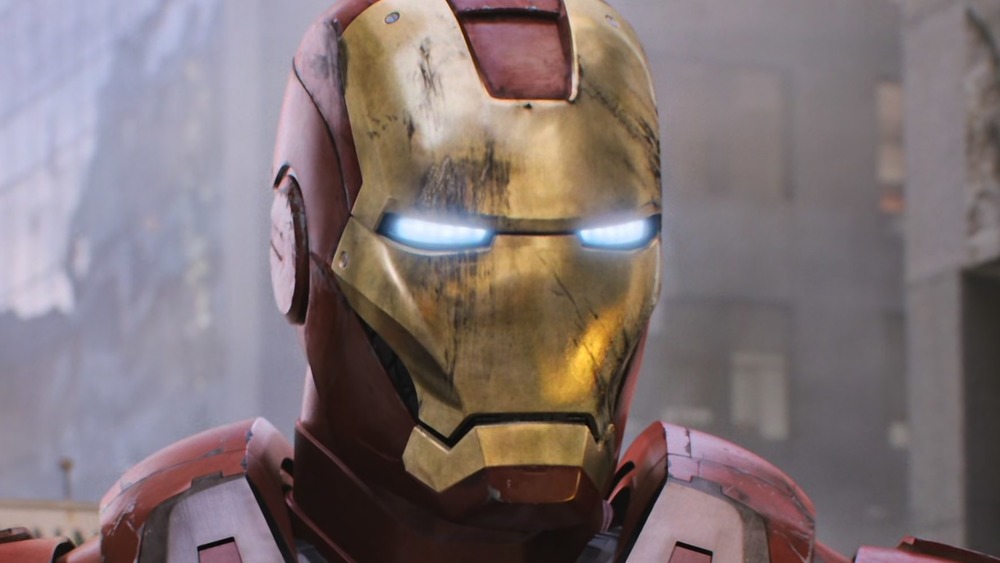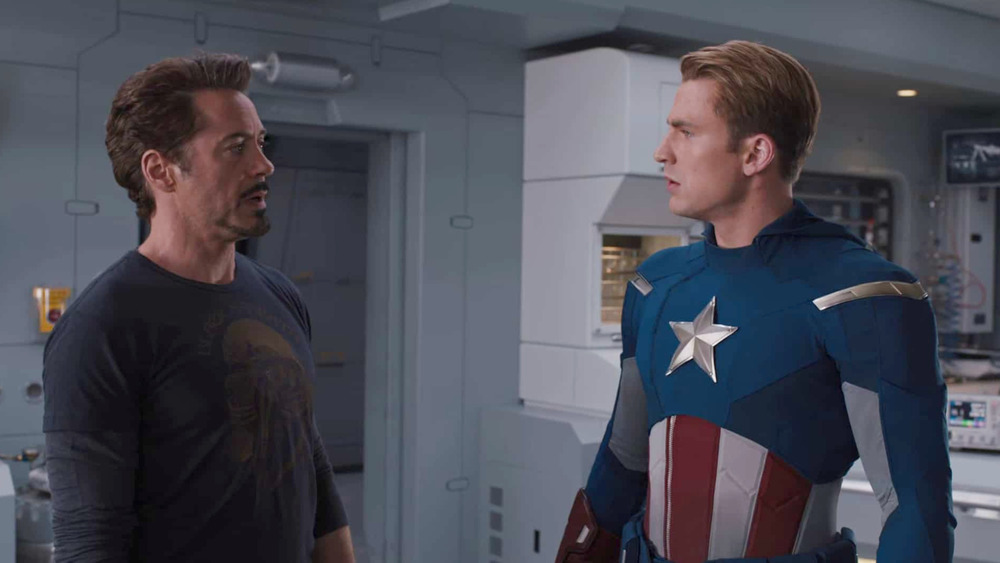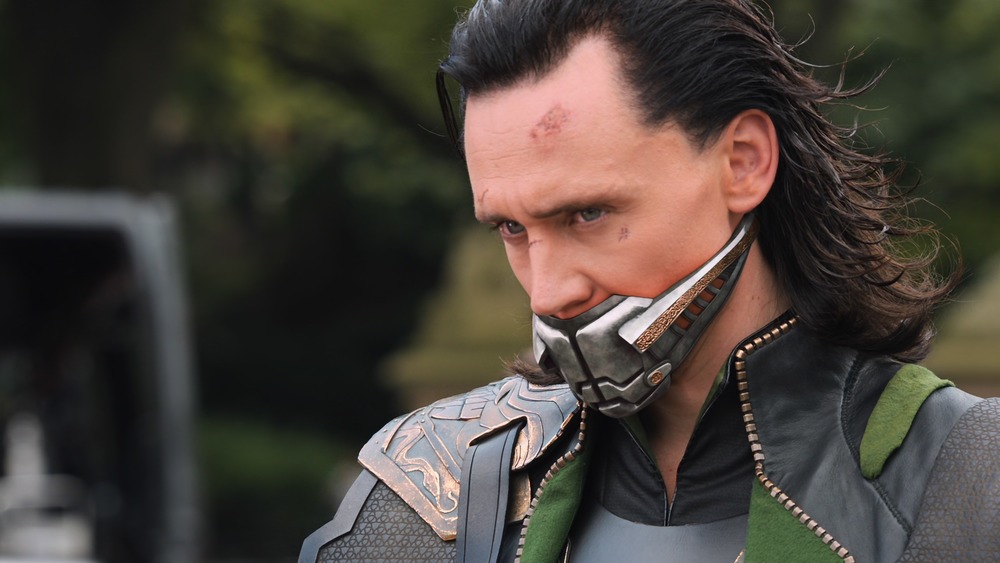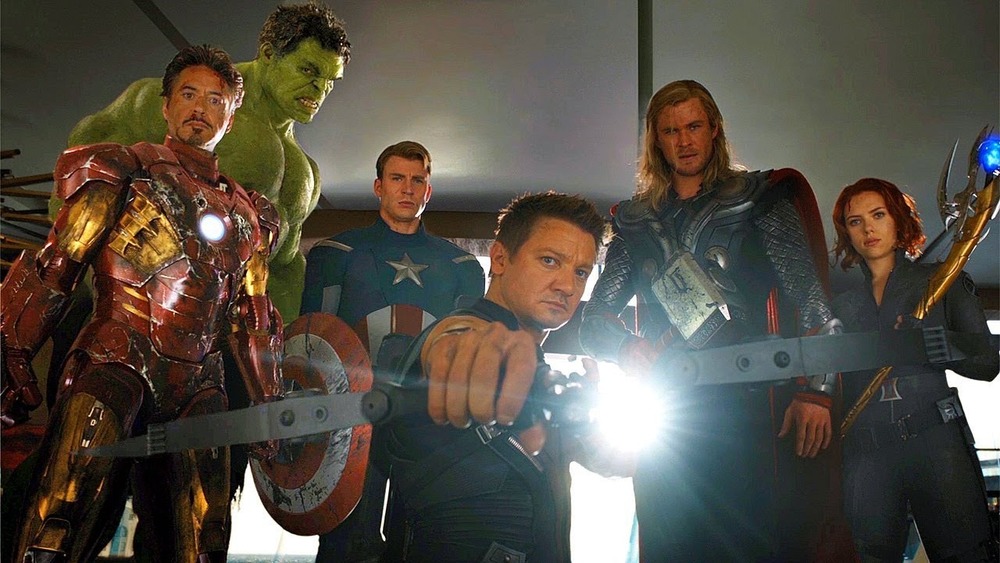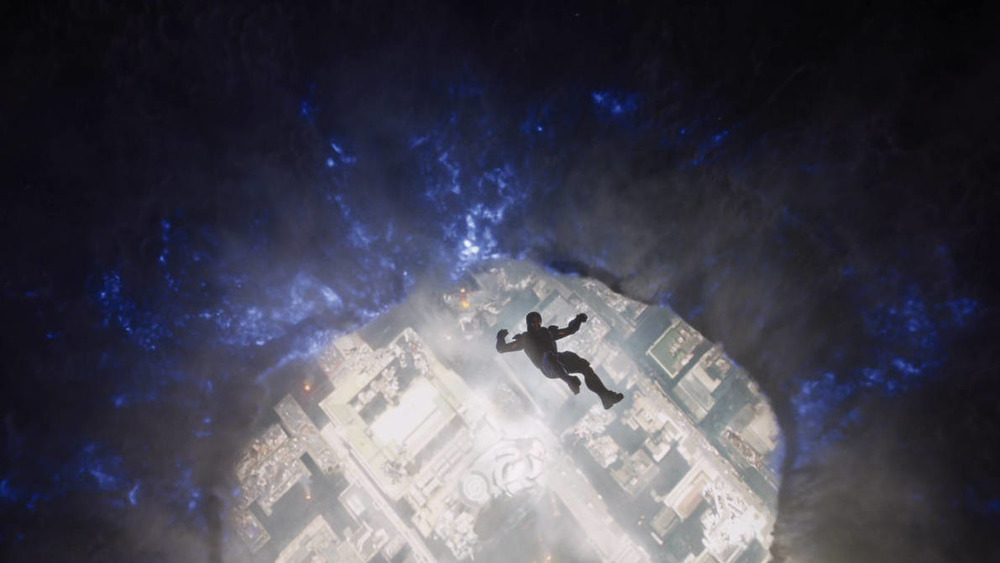The Ending Of The Avengers Explained
It's hard to believe The Avengers came out nearly a decade ago. The 2012 film pairs up the six original Marvel Cinematic Universe heroes for the first time and paves the way for all team-up flicks to come. At the time, it was one of the most anticipated movies ever, and boy, did it live up to the hype. The Avengers received rave reviews, earning a certified fresh rating of 91 percent on Rotten Tomatoes to solidify the fact that even critics love a good superhero flick.
The movie is so much more than Captain America (Chris Evans) and the gang smashing in some Chitauri skulls and saving New York City from total annihilation, though. It's also a major setup for everything that happens in Phase 2 and 3 of the MCU. When The Avengers begins, the original six Avengers are in different levels of introduction in the MCU. Tony Stark, aka Iron Man (Robert Downey Jr.), already had two solo films under his belt, while Cap and Thor (Chris Hemsworth) had only one. Natasha Romanoff, aka Black Widow (Scarlett Johansson), was introduced as a supporting character in Iron Man 2, and her best pal Clint Barton, aka Hawkeye (Jeremy Renner), had only a tiny cameo in Thor. The Avengers is basically an introductory film for Clint, as well as for Mark Ruffalo's Bruce Banner. (MCU fans had already seen one version of the Hulk played by Edward Norton in 2008's The Incredible Hulk, but there was an Aunt-Viv-level casting shift and Ruffalo was brought in to take on the big green mantle thereafter.)
While The Avengers is its own movie with a solid beginning-to-end story, it also manages to lay the groundwork for many things that happen in subsequent films. It develops themes that unravel out through Phase 3, and essentially sets the stage for all superhero team-up movies going forward, no matter the studio. Here's how The Avengers ends, and how it shapes everything that comes after it in the MCU.
Steve Rogers and Tony Stark's difficult beginnings, and Avengers partnerships moving forward
The Avengers marks the first time fans see Steve Rogers (Evans) and Tony Stark meet on the big screen, and it isn't love at first sight — or second sight, for that matter. The movie establishes the duo's frenemy relationship, which is cemented in the laboratory scene just before the Helicarrier is ambushed. Steve and Tony go toe-to-toe with insults — which really are just accurate observations — and it's a back-and-forth we'd later see repeated in Avengers: Age of Ultron and Captain America: Civil War. While the two seem somewhat friendly at the end of The Avengers and even share a handshake, it's clear it won't be a fairytale ending for Steve and Tony. Both men take off in very appropriate vehicles: Steve rides off into the sunset on a motorcycle, while Tony opts for an under-the-radar Audi convertible.
The ending of The Avengers also sets the stage for different friendships and partnerships moving forward. Clint Barton and Natasha Romanoff ride off together, as do Tony and Bruce Banner.The relationships between these pairs end up playing an integral role in Phases 2 and 3 of the MCU, and The Avengers is smart to set up the building blocks for them as quickly as possible.
Tony and Bruce's partnership ultimately results in the creation of everyone's least-favorite murder-bot Ultron and, subsequently, Paul Bettany's Vision. Natasha and Clint remain ride-or-die friends throughout the next several Marvel films, and eventually leads to one of the Infinity Saga's most gut-wrenching moments when Natasha sacrifices herself for her friend (and the entire universe, pretty much).
Loki becomes the lovable villain we just can't quit
In superhero films and most action films in general, we normally have the good guy and the bad guy, with the latter more often than not meeting their demise, never to be heard from again. That couldn't be further from Loki's (Tom Hiddleston) storyline. The Avengers is the second time we see Loki as a villain, following after his cinematic debut in 2011's Thor, and the threat he poses is on a much grander scale the second time around.
This movie does something for Loki and his relationships with viewers: It lays the groundwork for him to become the villain we love. The Avengers proves that there doesn't need to be a one-and-done when it comes to villains, and having them looming overhead is much more enjoyable than watching them come and go.
Additionally, The Avengers deepens and further complicates the relationship between adoptive brothers Thor and Loki. In the film's finale, Thor takes Loki off Earth with the Tesseract in hand, and the latter is eventually imprisoned on Asgard. Within the MCU, this marked the second time Thor defeated his brother, which seemed to set off a switch in Loki, bringing him to aid his brother in the future and not necessarily fight against him.
Avengers: Friends or Foes?
At the end of The Avengers, news reporters are seen interviewing several New York City citizens, and it seems the population is divided on whether the Avengers are good or bad. Obviously, fans know the heroes are the greatest thing since shawarma, but the movie sets a precedent for how these characters would be received in future films.
Case in point: Avengers: Age of Ultron and Captain America: Civil War. In Age of Ultron, Tony Stark and Bruce Banner's creation almost brings the world to extinction, and while they eventually save the day, innocent lives are lost because of their over-confident meddling. The Hulk's all-outrage war with the Hulkbuster in Africa also brings the group to an overwhelming amount of media hate, causing them to go into hiding. Captain America: Civil War sees the now plumped-up Avengers team get slapped on the wrist with the Sokovia Accords, which limits their jurisdiction, if you will. How the world views the Avengers changed everything and divides the group into two, ripping themselves apart. The Avengers' ending foreshadows all of this with the scene at the end where the public gets polled about whether the heroes are truly heroes or not.
The beginning of the Endgame
The first time the word "endgame" is mentioned in the MCU is in Avengers: Age of Ultron, but Tony gets a taste of it during The Avengers. He sees the bigger threat immediately, especially when entering the portal in space and seeing the arsenal that loomed. It was the events of this film, and the introduction of other world's into his reality, that would shape the MCU going forward.
Obviously, this was also our first introduction to Thanos, the Infinity Saga's big bad. While he's introduced only in a brief post-credits scene, his impact lasted with moviegoers at the time, prompting them to go home and research the purple villain, only heightening their excitement for future films.
All in all, The Avengers is the set-up of all set-ups, doing so while delivering a fully fleshed-out story with a beginning, middle, and ultra-satisfying ending with one of the greatest superhero battles on film — at that point in time, anyway.
